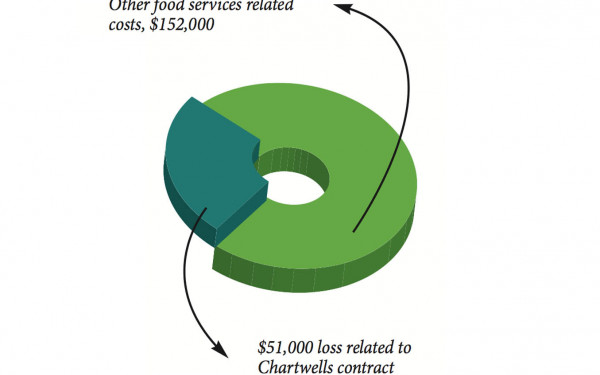Shepard Unveils Three-Point University-City Partnership Plan
Concordia President Calls on Montreal to Invest in its Talent
Addressing his audience of some 600 people—including the mayor-elect and some of Montreal’s most prominent business leaders—Concordia President Alan Shepard said he thinks higher education is gearing up for a 21st century paradigm shift.
“The university world is ready for a renaissance—as is our city. That’s not a coincidence,” he told his listeners on Friday, inside the downtown Sheraton Hotel’s ballroom.
“Today, the links between universities and cities—between the knowledge economy, technology and growth on a global scale—are obvious. […] To create a renaissance, we need to launch a major new initiative. A project that will attract new Quebecers while keeping our students here. A project that will inspire us.”
The 21st Century Plan
During the event, hosted by the Board of Trade of Metropolitan Montreal, Shepard unveiled his three-part vision of what that project might look like.
Seats to the speaking engagement included a served grilled salmon lunch and were priced at $85 and $125 for BTMM members and non-members, respectively.
Prominent audience members included Montreal mayor-elect Denis Coderre, BMO Chairman and Concordia Chancellor L. Jacques Ménard, Norman Hébert, Jr., chair of Concordia’s Board of Governors and Darrell Johnston, regional VP Eastern Canada for Compass Group.
Compass Group is the parent company of Chartwells Inc., Concordia’s current food service provider, which is facing rising opposition on campus from a student-led campaign seeking to replace the world’s largest supplier of prison cafeteria food with a student-run cooperative once Chartwells’ contract with the university expires in 2015.
The BTMM luncheon was Shepard’s first major speaking engagement representing Concordia since becoming president in August 2012.
Shepard says his plan would start with establishing about 100 entrepreneurial “start-up zones” built across the city, in hopes of linking about 20,000 students with companies and NGOs to tackle multidisciplinary ideas with real-world applications.
“Sound impossible? A generation ago, the very idea of having nearly 200,000 university students in our city would have seemed impossible too,” said Shepard.
“These start-up zones would capture business and engineering opportunities and also the full spectrum of social innovation.
“Mixing engineers, designers and artists together in a room produces magic. I’ve seen it.”
Concordia cross-faculty start-up resource District 3 was launched under Shepard last year. Shepard was also a key facilitator in the Digital Media Zone, a start-up incubator at Ryerson University—where he was provost before coming to Concordia.
The second proposal of Shepard’s plan would see new tax credits put in place in an attempt to support start-up zones. Shepard explained he believed New York’s recent “Start-Up New York” initiative could serve as a model for Montreal.
The project was implemented by New York Governor Andrew Cuomo, and will see a complete 10-year waive on all corporate, property or sales tax from businesses that set up shop near the State University of New York.
Shepard’s third proposal challenged Montreal to find new ways to invest in city and university infrastructures as well as in the talent coming out of its universities, but he did not provide any concrete ways in which to do so.
He says the novel ideas and research that would come out of start-up zones will present new ways to reinvest in talent and infrastructure, but Montreal as a city needs to have “an explicit will to compete globally.”
“Is it too much to dream that we might create the next Google or the next Meals on Wheels, or even design the next Mars rover here in Montreal?” he quipped.
“Now more than ever, we need to work together, not just to maintain the status quo but to go beyond it.
“Other cities have done it. We can do it too.”
On the Charter and Next Steps
Speaking to reporters following his speech, Shepard was still unable to provide an official position for Concordia on the proposed Charter of Quebec Values.
He says now that Bill 60 has been tabled by the National Assembly, he will return to Concordia’s Senate and Board of Governors to develop the university’s finalized stance. He has also welcomed the Concordia community to share their thoughts by emailing him.
“[There are] groups that have been speaking against it, it’s been the unions primarily, but I’ve had a few individuals say to me various reasons they are in favour it,” he explained.
“I think we are all in favour of the equality of men and women and I don’t think that is at all difficult [to agree with], but some of the other pieces are controversial.”
As for his three-point plan for universities, he says Concordia’s next step is securing its place in the 21st century by showcasing the innovation it is continually fostering.
“Concordia deserves to be a leader in Quebec and Montreal; we’re one of the largest universities in the nation, and I think people should be interested in our ideas and I think they were interested in our ideas [today],” he told The Link following his presentation.


_600_832_s.png)


.ed2.WEB_600_375_90_s_c1.jpg)
_900_598_90_600_375_90_s_c1.jpg)
1_600_375_90_s_c1.jpg)